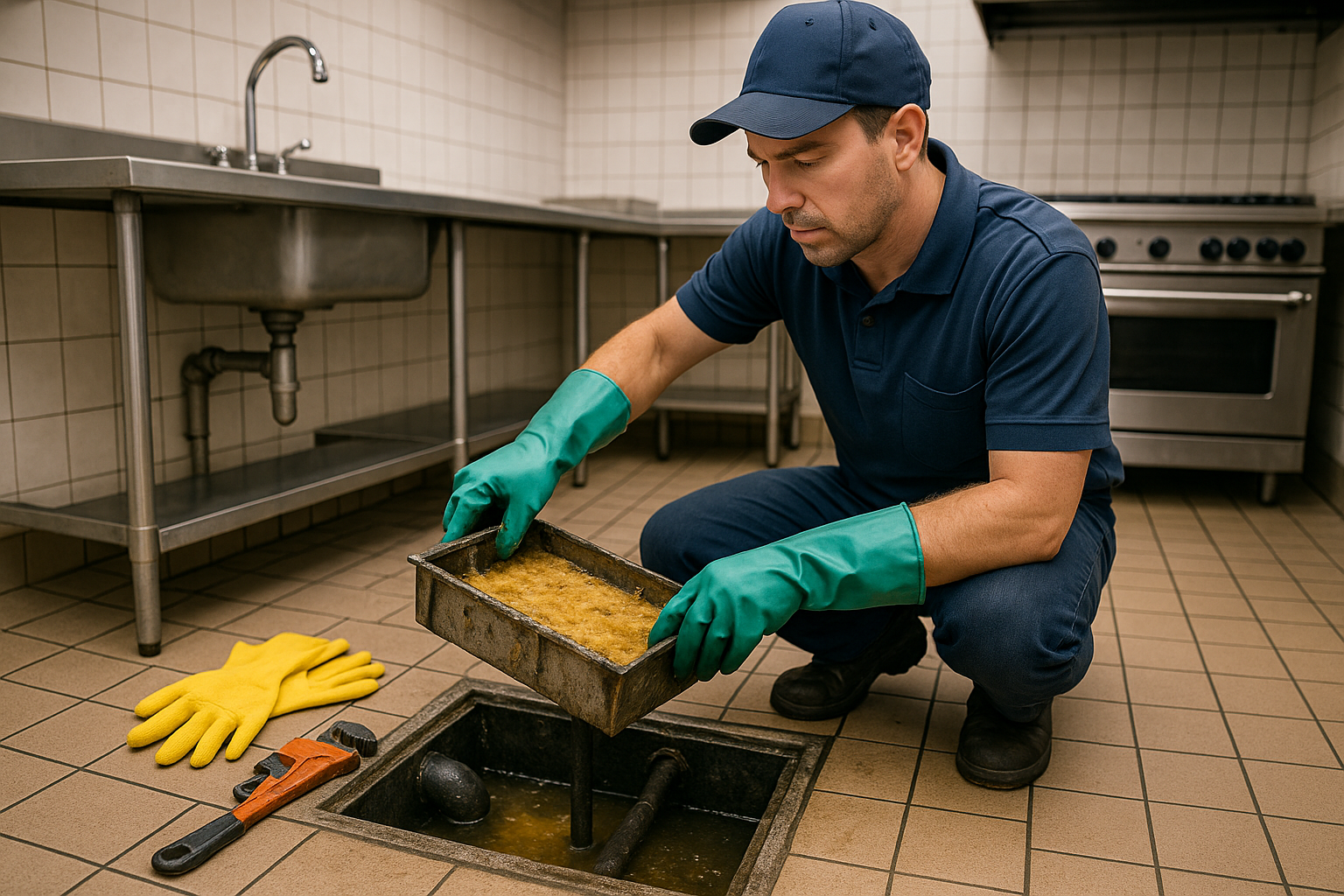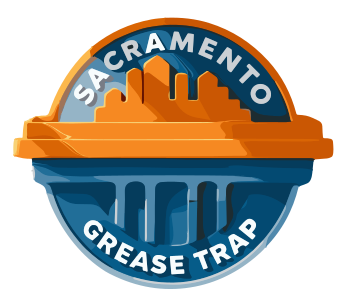Smelly Grease Trap? Easy Ways to Banish Bad Odors

Have you ever walked into your kitchen and been hit with a foul smell you just can’t place, only to realize it’s coming from your grease trap? You’re not alone. Grease trap cleaning is one of the most overlooked yet essential parts of restaurant grease maintenance, and neglecting it often leads to unpleasant odors that linger in the air. These smells can turn an otherwise fresh and inviting space into something you’d rather avoid, especially when dealing with bad smell in kitchen drain issues.
The good news? Those nasty smells don’t have to stick around. In this guide, we’ll break down why grease traps start to stink and share simple, effective ways to eliminate kitchen odor before it gets out of hand. Think of it as a quick odor control solution and an essential part of your kitchen hygiene tips that you can use anytime.
Getting rid of grease trap smells isn’t just about comfort—it’s about health, cleanliness, and protecting your plumbing system. Ignoring the signs of odor could indicate clogs, buildup, or more severe maintenance issues down the line. That’s why it’s worth learning how to clean grease traps properly and sticking to a grease trap maintenance schedule. By doing so, you not only remove foul smells but also prevent grease buildup and ensure smooth kitchen operations.
By the end of this post, you’ll know exactly how to banish grease trap odors—from easy cleaning habits to preventive strategies. You’ll walk away with practical steps, plumbing maintenance tips, and tools to keep your kitchen fresh, clean, and odor-free.
Why Grease Traps Smell in the First Place
Grease traps have been around for more than a century, originally designed to keep fats, oils, and grease—often called FOG—from clogging public sewer systems. As restaurants and commercial kitchen cleaning services became more common, so did the need for proper grease interceptor maintenance. Over time, these systems became essential for both homeowners and foodservice businesses, playing a key role in sewer odor prevention and keeping plumbing systems running smoothly.
A grease trap works by separating grease from wastewater before it enters your pipes. The lighter grease floats to the top, solids sink to the bottom, and cleaner water flows out through the middle. But just like your household trash can, what’s caught inside doesn’t stay fresh for long. Without routine grease trap inspection, trapped food particles and fats start to decompose, releasing those offensive smells that invade your kitchen.
Today, grease waste disposal is more critical than ever. With busier kitchens and higher food output, traps fill up quickly. Skipping routine grease trap pumping service or cleaning sessions can lead to stronger smells, blocked pipes, and even health code violations. Even at home, neglecting restaurant drain maintenance can create costly plumbing problems or persistent kitchen sink smells.
The Science Behind Grease Trap Odors
At the core of every smelly grease trap is one simple truth: when food waste and grease sit too long, they begin to break down. This process, called decomposition, releases gases and bacteria that create that unmistakable rotten-egg stench. Knowing what’s happening inside your trap helps you prevent it with targeted grease trap treatment and the right odor control solutions.
Here are the main culprits behind those nasty smells:
- Trapped Food Particles – Tiny bits of food rot at the bottom, releasing a sour, pungent odor.
- Built-Up Grease Layers – Hardened grease traps gases beneath, making cleaning harder.
- Anaerobic Bacteria Growth – These thrive without oxygen, producing methane and sulfur compounds.
- Neglected Maintenance – Skipping scheduled cleanings allows all these issues to worsen.
To fight these causes, use an environmentally friendly grease cleaner or a grease trap deodorizer to neutralize odors. Professional grease trap cleaner services can ensure a deep clean and apply enzyme-based treatments that safely break down fats. If you prefer DIY grease trap cleaning, always use a drain cleaner for grease that’s safe for plumbing systems and helps remove grease trap odor naturally.
For busy kitchens, partnering with a commercial grease trap service ensures thorough maintenance while meeting grease trap regulations. For homes, consistent upkeep and proper food waste management go a long way toward preventing unwanted smells.
Why Tackling Grease Trap Odors Is Worth It
Dealing with grease trap odors might seem like a small task, but the payoff goes far beyond just a fresh-smelling kitchen. When you stay consistent with cleaning commercial kitchens and grease trap maintenance, you’re creating a cleaner, healthier, and more pleasant environment for everyone who uses the space.
Here’s what you’ll gain:
- Eliminate restaurant odor and improve the overall dining experience.
- Healthier environments with less bacterial growth.
- Fewer plumbing problems through consistent grease interceptor maintenance.
- Peace of mind knowing you’ve handled the issue before it escalates.
- Easier compliance with inspection requirements for foodservice establishments.
For instance, a café owner who committed to monthly grease trap cleaning not only solved recurring odor issues but also improved customer satisfaction and team morale. The grease trap cleaning cost was far less than what plumbing repairs or bad reviews would have cost.
Ultimately, regular maintenance isn’t just about removing smells—it’s about protecting your investment, your reputation, and your peace of mind.
The Challenges of Keeping Grease Trap Odors Under Control
Grease traps are vital, but maintaining them can be challenging. Between time constraints, cost, and the unpleasant nature of the job, many people put it off. However, ignoring regular cleaning can lead to long-term consequences like overflowing traps and system damage, which can be avoided with proper overflow prevention practices.
Here are common hurdles you might face:
- Frequent Maintenance Needs – Busy kitchens fill traps quickly, requiring constant care.
- Hidden Residue – Even after cleaning, grease can linger in corners and pipes.
- Professional Costs – Hiring experts for deep cleaning can add up.
- Time and Effort – For many, it feels like just another chore.
The solutions, however, are simple:
- Stick to a grease trap maintenance schedule and set reminders.
- Hire a trusted commercial kitchen cleaning service for deep cleaning.
- Use enzyme-based cleaners and grease trap bacteria treatment regularly.
- Include routine grease trap inspection as part of your maintenance plan.
- Follow consistent plumbing maintenance tips and budget for upkeep.
By combining small daily habits and professional care, you’ll minimize odor risks and extend the life of your system.
Simple Steps to Eliminate Grease Trap Odors
Now that you understand why grease traps smell, it’s time to take action. Here’s a practical approach to drain smell removal and odor prevention:
- Scrape plates before rinsing to minimize grease waste disposal.
- Flush with hot water to break down oils.
- Use grease trap treatment or eco-friendly enzyme cleaners to dissolve buildup.
- Schedule routine grease trap pumping service for thorough cleaning.
- Apply a grease trap deodorizer after cleaning to neutralize lingering odors.
- Stay alert for how to stop drain smell signs like slow drainage or minor odors.
Keep a cleaning log or use reminders to track your maintenance. Consistency is key, whether through DIY grease trap cleaning or hiring professionals.
The Future of Grease Trap Care and Odor Control
The future of grease trap care looks cleaner, greener, and more efficient. Advancements in in-ground grease traps and industrial odor eliminators are making maintenance easier and more sustainable.
Emerging trends include:
- Smart Technology – Sensors that detect when cleaning is needed.
- Eco-Friendly Products – More sustainable grease trap bacteria treatment and enzyme-based options.
- Service Automation – Subscription-based commercial grease trap service options for regular upkeep.
- Stricter Regulations – Governments emphasizing proper septic and grease management practices.
These innovations are transforming both homes and businesses. Homeowners benefit from easier, safer cleaning, while restaurant owners enjoy more efficient systems and fewer complaints.
Wrapping It Up: A Fresher Future for Your Kitchen
From understanding why grease traps smell to implementing odor control solutions, you now have all the tools to keep your kitchen odor-free. Routine maintenance, restaurant drain maintenance, and eco-friendly cleaning methods help you stay ahead of problems while ensuring a clean, compliant workspace.
By adopting these strategies—consistent cleaning, proper grease waste disposal, and responsible food waste management—you’ll enjoy a kitchen that smells fresh and functions efficiently. Whether you’re managing a restaurant or maintaining your home, a clean grease trap means peace of mind, healthier air, and smoother plumbing.
Start today—set your schedule, gather your supplies, and take that first step toward a cleaner, fresher kitchen.

Let Us Simplify Your Grease Trap Maintenance.
Proper grease trap maintenance will reduce costly repairs in the future.
.avif)

